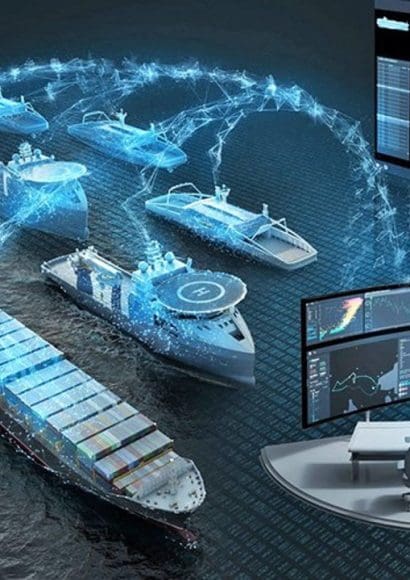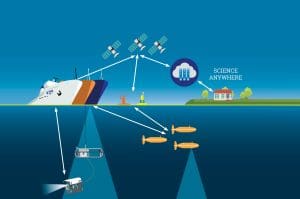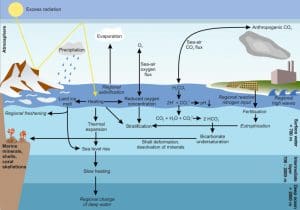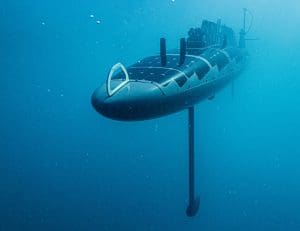
The ocean has been a mystery to humanity for as long as we can remember. Although significant advances have been made in its study, recent discoveries in oceanography have revealed fascinating details about its depths, ecosystems, and its relationship with global climate. As researchers delve deeper into the ocean, what we discover not only reshapes our understanding of the aquatic world but also of the Earth itself.
In this article, we will explore the most recent advances in oceanography, from the mysteries of ocean trenches to surprising discoveries about marine biodiversity. Get ready to dive into a fascinating journey through the depths of the sea.
Contents
The Rise of Modern Oceanography🐟
Exploring the Ocean Trenches
One of the most striking recent discoveries in oceanography comes from ocean trenches. These extreme depths, like the Mariana Trench, have been explored using new technologies that reveal a world previously unknown. Submarine robots and specialized drones have successfully mapped unexplored underwater terrains.
New Marine Exploration Techniques
The advancement in underwater technology has been key to modern ocean exploration. Autonomous submersibles and unmanned vehicles have allowed scientists to reach places previously inaccessible. These tools not only facilitate the exploration of great depths but are also critical for monitoring climatic and geological changes in the ocean.
Moreover, with the use of high-resolution sonars, mapping the ocean floor has improved significantly. Mountain ranges and hidden canyons have been identified, playing a crucial role in ocean circulation and, ultimately, global climate.
The Secrets of Marine Biodiversity🐟
The Discovery of New Species
As we explore deeper into the oceans, hundreds of new species have been found. From bioluminescent creatures to organisms that live in symbiosis with bacteria that metabolize chemical compounds, the ocean continues to surprise us with its biodiversity.
One of the most fascinating discoveries has been that of species living in hydrothermal ecosystems. These species, thriving in extremely hostile environments, challenge the traditional understanding of life on Earth. Scientists have identified organisms that metabolize sulfur instead of oxygen, showing how life can adapt to conditions once thought impossible for its existence.
Unknown Ecosystems
Another of the recent discoveries in oceanography has been the identification of unknown underwater ecosystems. Coral forests have been found at extreme depths, where it was previously thought such organisms could not exist. These discoveries are crucial for understanding the health of the oceans, as deep-sea corals play a vital role in water filtration and supporting marine species.
If you’re a fan of seafood, check out our 5 Recipes with Lenguado Fish for some mouthwatering dishes you can make at home.
The Ocean and Climate Change🐟
The Ocean’s Role in Climate Regulation
The ocean acts as a gigantic regulator of the Earth’s climate. It absorbs heat and carbon dioxide from the atmosphere, helping to moderate global temperatures. However, in recent decades, this crucial role has been impacted by global warming.
Recent research has shown that the oceans are absorbing more heat than previously thought. The increase in sea surface temperatures is not only causing the decline of sensitive marine ecosystems, such as coral reefs, but also altering ocean currents, which could have devastating consequences for global climate.
Acidification and Its Impact
One issue that has caught scientists’ attention is ocean acidification. This phenomenon occurs when carbon dioxide dissolves in seawater, forming carbonic acid. This lowers the ocean’s pH, which has detrimental effects on many forms of marine life, especially those that rely on calcium to build their shells and skeletons, such as corals and some types of plankton.
Recent discoveries in oceanography have shown that acidification is happening at a faster rate than previously anticipated. This poses significant challenges for the conservation of marine biodiversity and the food security of millions of people who rely on the oceans for their livelihoods.
Technological Innovations for Studying the Ocean🐟
The Submarine Sensor Revolution
To better understand the changes happening in the oceans, scientists have developed a new generation of underwater sensors. These devices can collect real-time data on temperature, salinity, oxygen levels, and other critical parameters. Additionally, they can be deployed for extended periods, allowing researchers to monitor the ocean continuously.

One of the most ambitious projects is the deployment of networks of smart buoys around the world, transmitting information directly to research centers. These systems help predict climatic phenomena like El Niño or La Niña, which have a global impact on weather patterns and agriculture.
Artificial Intelligence and Data Analysis
The amount of data collected by these sensors and other marine exploration tools is enormous. Therefore, scientists are using artificial intelligence (AI) to analyze these data. AI can detect patterns that humans might overlook and predict changes in the oceans with greater accuracy.
The Future of Oceanographic Research🐟
Upcoming Challenges
Despite significant advances, the ocean remains one of the least explored places on Earth. We have only mapped a small percentage of its depths, and it is estimated that thousands of species remain to be discovered. Climate change, pollution, and overexploitation of marine resources are some of the biggest challenges facing scientists in studying the ocean.
It is crucial that we continue to invest in research and the development of new technologies to address these challenges. The future of our oceans, and therefore the planet, depends on our ability to understand and protect these vast ecosystems. To dive deeper into ocean studies, learn about the Advances in the Cartography of the Ocean Floor, which are reshaping our understanding of marine landscapes.
The Importance of International Collaboration
Finally, we cannot discuss recent discoveries in oceanography without mentioning the importance of international collaboration. Oceans know no borders, and the problems affecting them are global. Therefore, cooperation between countries and organizations is essential to address the challenges of marine conservation and research.
Organizations like UNESCO, through its Intergovernmental Oceanographic Commission program, are working to coordinate international efforts in ocean research and protection.


